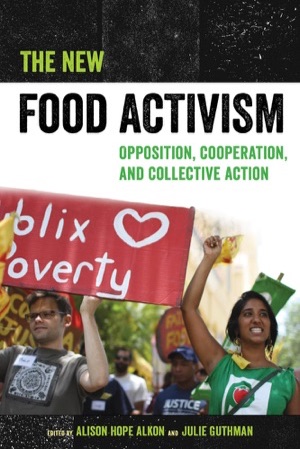After 20 years of scholarship at the forefront of food activism, Julie Guthman is gratified to see the movement expanding beyond market-based strategies that have catered to consumers with cash to burn.
The struggle to transform the food system—to make food production more ecologically sound, to protect the health and well-being of farmworkers, to increase the access and affordability of fresh food—is becoming more oppositional and more collective, said Guthman, co-editor with Alison Hope Alkon of the new book, The New Food Activism: Opposition, Cooperation, and Collective Action (Oakland, CA: University of California Press, 2017).
"There are limits to shopping your way to social change. Strategies focused on individual buying decisions, like buying organic and fair-trade food, are inherently limited because they are based on their appeal to consumers who are able and willing to pay more," said Guthman, a professor of social sciences at the University of California, Santa Cruz. "They don't undermine existing structures."
The weakness of the "pocketbook" approach is evident in acreage figures: Organic acreage still accounts for less than 1 percent of farmland in the United States, and only 5 percent of sales, according to Guthman. "Something about market-based approaches is not working when the best we can accomplish is ensuring that a small number of consumers get beautiful, healthy, fresh food while everybody else gets the dregs," she observed. "Activism should be based in the concerns of those most hurt by existing policies and practices."
Food movement leaders are embracing new avenues as they press for more sweeping change, including greater regulation of pesticides, immigration reform, and changes to federal farm subsidies.
In The New Food Activism, contributors critique mainstream food movements and shine a light on examples of food activism that pushed the boundaries and emerged triumphant. Chapters cover the work of pesticide-drift activists in California; the battle in Canada against genetically modified wheat; the demise of methyl iodide in California; and several chapters focus on struggles to bring greater justice to food workers, including campaigns for "good jobs, good wages, and good food." Throughout the book, the emphasis is on building movements that are multiracial, multiclass, and geographically diverse.
"The labor and food-justice movements were on different tracks, but now they are aligning," said Guthman, adding that new coalitions have formed at a critical historical moment.
"The Trump administration's agenda has alerted the public at large that policy matters, and that overhauling the food system is about more than creating utopian gardens," said Guthman. "We are finally seeing more pushback because people want real change. They want economic, environmental, and social justice and they are beginning to understand that collective public action works."




